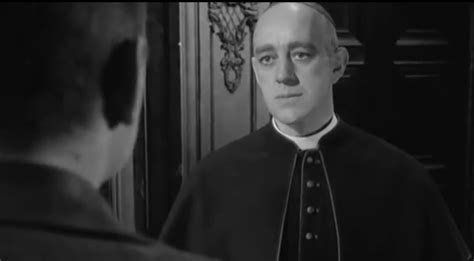 |
| Not Obi-wan. |
We don’t call it make-believe for nothing. Whether its root be that you make as if you believe something to be true, or by your actions you make other people believe what you have invented, it is the pastime of children and the profession of actors in the theatre and the cinema. When the audience contributes the suspension of disbelief, any number of improbable or impossible propositions can be enjoyed as entertainment.
Alec Guinness was one of the great classically trained British actors of the twentieth century, celebrated for his work on stage and screen. Like many of his peers in the acting aristocracy, he undertook roles in American films because they paid better than the loftier pursuits of Shakespeare and such. He brought both dignity and skill to his roles, leaving his mark in the minds of all who saw his work. Thus he is indelibly associated with the character Obi-Wan Kenobi from the original Star Wars films.
One of his memorable lines from that first film seems to have found legs recently as I have heard people saying, These aren’t the droids you’re looking for. He utters it gently but convincingly, and because the force can be effective with the weak-minded, the bad guys not only accept but repeat the falsehood he has told them.
It could be argued that Alec Guinness could make one believe anything he uttered with masterful and articulate conviction, and that is indeed how he made his living. But somehow I have an album of his reading of a number of Christian texts – medieval and modern poems, spiritual writings, and letters from saints. I was listening to it as I drove around for errands the other day, and he delivers these words with richness and force.
During his career, Alec Guinness became a Catholic, and spoke movingly of his faith. One of the experiences that contributed to his conversion occurred when he was playing the role of a priest in a film, an example of make-believe helping to make him believe something that is, in fact, true.
My album offers no citations for the Christian passages Guinness reads, but one of them impressed me enough that I engaged the infernal machine to find it. Let me share it with you now, an excerpt from A Remaining Christmas, a 1928 essay by Hilaire Belloc. I wish you could hear Guinness deliver it with the clarity and conviction of a man who can convince a storm trooper, These aren’t the droids you’re looking for. It would help you recognize the truth that you are looking for and believe it -- which is very different from make-believe.
Monsignor Smith
Man has a body as well as a soul, and the whole of man, soul and body, is nourished sanely by a multiplicity of observed traditional things. Moreover, there is this great quality in the unchanging practice of Holy Seasons, that it makes explicable, tolerable, and normal what is otherwise a shocking and intolerable and even in the fullest sense, abnormal thing. I mean, the mortality of immortal men.
Not only death (which shakes and rends all that is human in us, creating a monstrous separation and threatening the soul with isolation which destroys), not only death, but that accompaniment of mortality which is a perpetual series of lesser deaths and is called change, are challenged, chained, and put in their place by unaltered and successive acts of seasonable regard for loss and dereliction and mutability. The threats of despair, remorse, necessary expiation, weariness almost beyond bearing, dull repetition of things apparently fruitless, unnecessary and without meaning, estrangement, the misunderstanding of mind by mind, forgetfulness which is a false alarm, grief, and repentance, which are true ones, but of a sad company, young men perished in battle before their parents had lost vigour in age, the perils of sickness in the body and even in the mind, anxiety, honour harassed, all the bitterness of living—become part of a large business which may lead to Beatitude. For they are all connected in the memory with holy day after holy day, year by year, binding the generations together; carrying on even in this world, as it were, the life of the dead and giving corporate substance, permanence and stability, without the symbol of which (at least) the vast increasing burden of life might at last conquer us and be no longer borne.